Located in the heart of Caracas, Cordero is the first restaurant in Venezuela with a menu focused exclusively on lamb – and now also the first venue from its country to receive the American Express One To Watch Award, bestowed as part of Latin America’s 50 Best Restaurants 2023. Read on to savour the story and flavours of this temple to lamb
When Venezuelan entrepreneur Pedro Khalil approached chef Issam Koteich to open a single-protein restaurant in Caracas specialised in lamb, the cook’s response came swiftly. It was a rounded “no”. “I thought it was a crazy idea,” says Koteich, smiling. Fortunately, Khalil's persistence paid off and in June 2022, Cordero opened its doors with Koteich leading the culinary proposal. The bet turned out to be a successful one – less than two years after opening, the project has received the ultimate accolade that celebrates new gastronomic proposals as part of Latin America’s 50 Best Restaurants 2023: the American Express One To Watch Award.
Cordero, literally ‘lamb’ in Spanish, is the first eatery in Venezuela – and, as Koteich puts it, “dare I say in the whole world” – where the entire menu is built exclusively around that single animal’s meat. Lamb is present everywhere, from starters to desserts, a feat made possible by the other half of the restaurant, Proyecto Ubre, a farm located just 40 minutes from Caracas and directed by the restaurant’s co-founder, Khalil.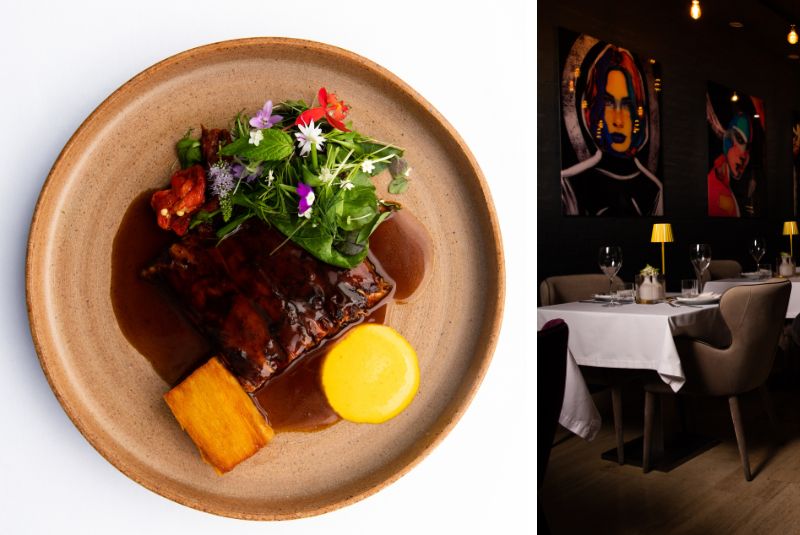
Cordero's menu is focused on lamb from starters to desserts (images: Andrés Vasquez)
The atmosphere at the innovative eatery combines classic fine dining hallmarks with modern style, evident even in the restaurant’s unexpected location inside a prestigious shopping centre in the Venezuelan capital. White tablecloths, crystal glasses and fancy cutlery create a harmonious contrast with the colourful paintings that hang on the walls – vibrant collages created by Koteich’s brother, Ali.
An unstoppable dream
Born in the Venezuelan city of Mérida but with Syrian heritage, Koteich grew up in a big family where abundance, creativity and variety were always applied to food, but he never pictured himself as a chef. “I used to cook with my mother and make food from around the world. I enjoyed it, but it was just that, something that I liked. I didn’t plan to end up in the kitchen,” he says.
After moving to Isla Margarita, an island just off the country’s northern coastline, to work in the hospitality industry, Koteich was encouraged by a chef friend to study gastronomy in San Sebastian, Spain. “Becoming a chef meant discovering other cultures, travelling and doing something that I was enjoying more and more,” says Cordero’s chef and co-founder, who left Venezuela with only 100 dollars in his pocket, but with a heart full of hopes and dreams.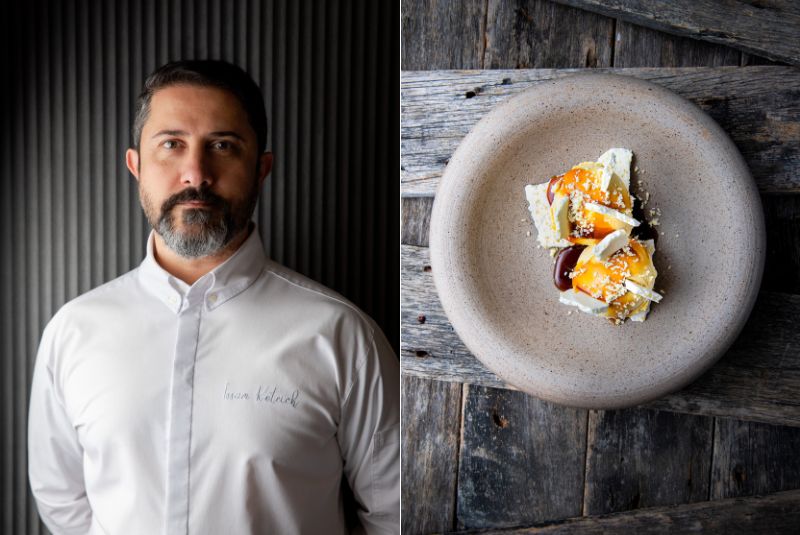
Koteich's first venture in Venezuela was a restaurant called Melao
Settled in San Sebastian, he trained at the now-closed Ramón Roteta Restaurante, then a local institution, where he became sous-chef, and undertook a stage at the world-famous Mugaritz. Years of experience in Europe led to a new adventure in Dubai in 2005, helping open a restaurant that received an award within a year of launching.
In 2011, he moved back to his hometown, Mérida, to open Melao, with a cuisine focused on local ingredients. Even though the eatery earned itself national recognition, the country’s political and economic situation led him to the hard decision of ending the project and moving abroad again. “When I closed Melao, I left crying, because I didn’t want to leave. But I had to,” says Koteich.
Persistence is key
Despite Khalil's insistence for Koteich to move back to Venezuela and open a restaurant with him, the chef firmly declined, with the memory of Melao still fresh in his mind. But when his life changed unexpectedly, so did his perspective on Khalil’s “crazy” project.
Koteich’s father passed away due to Covid-19 while the chef was working in Dubai, so he returned to Venezuela to spend some time with his family. While there, he finally agreed to hear more about Khalil’s idea. “When I got to the farm, I was like: ‘wow, it’s so beautiful here!’,” he recalls. “I've always loved that closeness to the land, the farming, the animals and the processing of products.”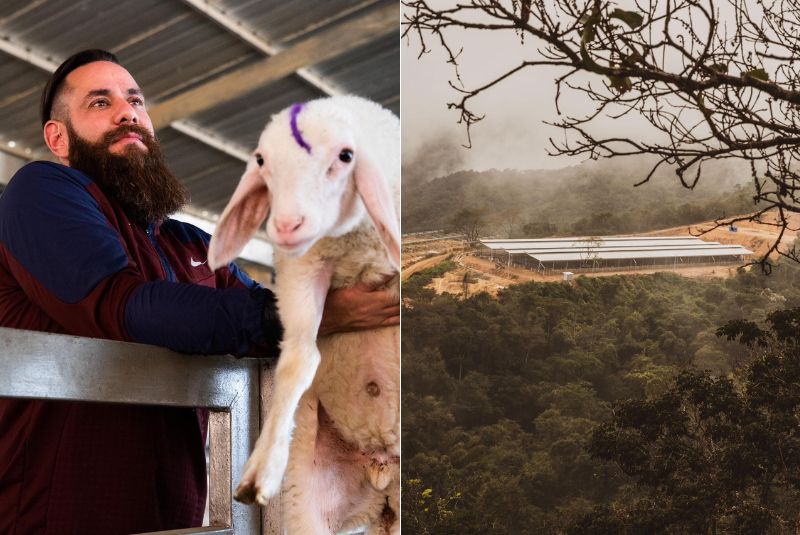
Khalil opened Proyecto Ubre in 2021
Even though Koteich only planned to help with the farm and the restaurant’s opening, he couldn’t help but fall in love with the project. He says: “I started talking to people and I was surprised by how much they enjoyed eating lamb. Within a couple of months, I was 'Mister Cordero’.”
From abundance to scarcity and back
During his first months at Melao, Koteich struggled to produce the same high-quality results he had in Spain with the lesser resources available in Venezuela. “I was trained in total abundance, so that when you ask for an oyster, they bring you 50,” he says. But the shortage of produce in Venezuela brought on by the challenging socio-economic situation shaped his kitchen style: “I had to adapt to what I could get and then transform it. It was like making magic.”
This is a skill Koteich learned over his nearly two decades of career across three continents. Adaptation is the superpower that keeps him flexible to changing circumstances and allows him to adjust not only his mental approach, but also his cooking style. “I concentrate on the products that are available and treat them in the best way possible,” says Koteich. “Before I get into the kitchen, I need to get into the pantry and understand what I’m going to use, where it comes from, why and how I can best use it.”
Thanks to Proyecto Ubre, Cordero doesn’t suffer from a lack of ingredients, but Koteich is still making magic. The restaurant serves a “cuisine of proximity”, with the farm’s team supplying over 80% of its pantry, including not only lamb but also cabbage, carrots, onions, tomato and even coffee.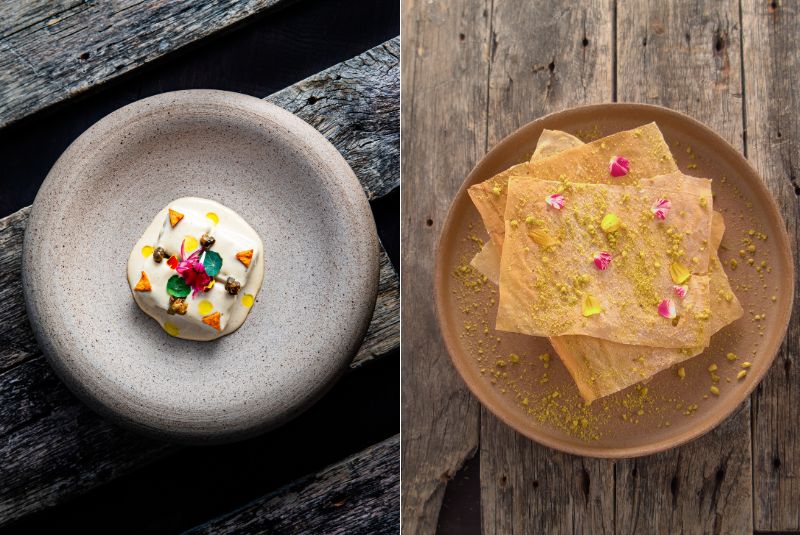
From left: Lingua Tonnata and San Charbel, signature dish and dessert at Cordero (images: Andrés Vasquez)
The à la carte menu features a total of 26 seasonally rotating dishes derived from lamb or sheep, whether as meat or dairy products. A carpaccio with basil, pine nuts and olive oil is served alongside cured cheese, while a sheep’s milk mozzarella is also part of the filling for tequeños (breaded and fried cheese sticks, a popular Venezuelan snack).
Among the plentiful main dish options, the crunchy paletilla (grilled suckling lamb, gravy and potato millefeuille) is just as much of a classic as the grilled lamb rack, served with smoked chimichurri, a crispy potato roll and greens. The chef even makes his own morcilla sausage– trading the traditional pork filling for the restaurant’s namesake protein – accompanied by creamy rice and bottarga; but his recommendation is the colourful cuello: a grilled lamb neck dipped in an acidified gravy, accompanied by roasted peppers and green salad with edible petals. The protein even finds its way into the desserts: a creamy sheep's cheesecake comes together with rose syrup and crispy filo in a bite full of texture called San Charbel.
An eight-course tasting menu is also available with advance reservation in the restaurant’s private dining rooms, featuring the mouth-watering tartare de cordero (lamb tartare) and the signature lingua tonnata, a combination of lamb’s tongue with tuna and a melt-in-the-mouth creamy sauce.
The beginning of a new Venezuela
The charismatic chef is hopeful for the future of Venezuela, even though he thinks that “there are a lot of things still to fix”, but people are starting to see the light at the end of the tunnel: “The atmosphere and the economy are different. There is a little light everywhere.” He’s hopeful and willing to be part of the change, highlighting: “I’m excited, I feel like a little kid with a big box of colours, ready to paint a plain canvas.”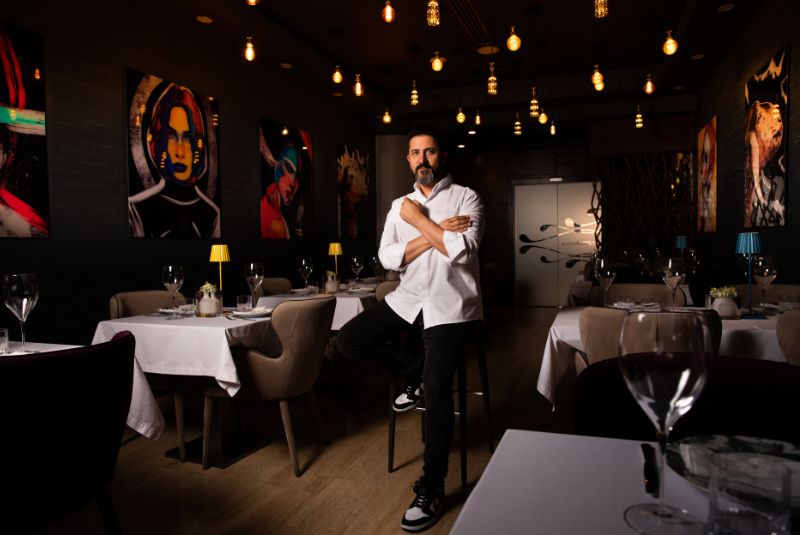
Koteich is proud to be part of the culinary renaissance happening in Venezuela (image: Natasha Lashly)
Asked about receiving the American Express One To Watch Award, Koteich’s voice breaks: “It’s a recognition of the trajectory and the maturity I have at this moment in my life. It’s the work of all the people in the kitchen and on the farm, my business partner and my family who support me. It’s also a ray of light [for Venezuela] and the beginning of opening our doors a little, so people can begin to see us. This prize is putting Venezuela back on the map.”
With the hope of seeing a brighter future, the chef is already making plans: Cordero will move to a bigger venue in 2024 with the intention of, as Koteich says, “democratising the cuisine and giving more options for more people”. He plans to update the menus to include more vegan and vegetarian options as well as adding autochthonous ingredients and recipes that he has been collecting over the course of 2023.
Cordero’s multi-faceted uniqueness – in Caracas and beyond – shines through in its menu focused on lamb, the proximity of its farm and its impeccable service, but most importantly in the passion and commitment that Koteich and Khalil feel towards the ingredients, the guests and their country. This is, as the chef says, “honest cooking” and “cooking with a purpose”: the purpose of lifting a resilient country with the incredible ability to rebuild itself against all odds.
Find out more about Cordero by watching the video:
The list of Latin America’s 50 Best Restaurants 2023, sponsored by S.Pellegrino & Acqua Panna, will be announced on Tuesday 28th November from Rio de Janeiro. To stay up to date with the latest news, follow us on Instagram, Facebook, X and YouTube, and sign up to our newsletter.
.jpg)
